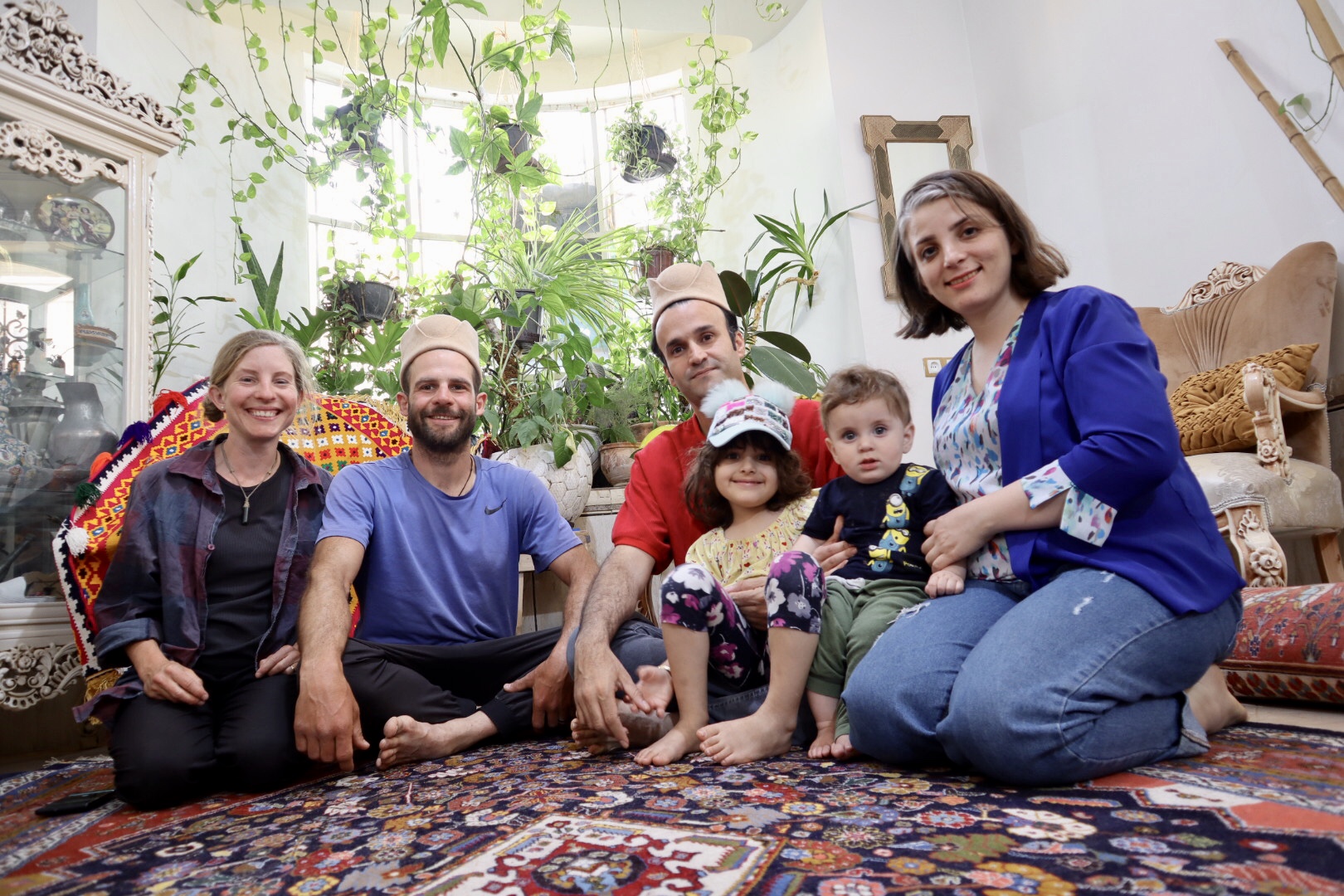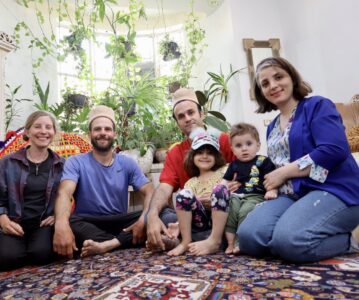In Shiraz we are already expected: Afshin and his family live in a quiet, old neighborhood on the outskirts of Shiraz. The city appears unspectacular to us at first glance. Sand-colored, multi-story houses, low-rise residential quarters, mandarin and mulberry trees along the roadsides. Here and there a park with a little more green space. Here, too, the riverbeds have dried up and the city is framed by barren, rugged cliffs. In Afshin’s residential area, things are a bit livelier: many Afghan families live here, who have found a new home here since the invasion of the Soviet Union in the 1990s. Everywhere children in traditional Afghan dresses play in the alleys, all kinds of goods are sold at small stalls, boys take out their bikes and we bump along the unpaved road to our temporary home.
The next few days fly by. Afshin finds time to pedal with us all over town and several times we end our days with a round of ping pong in the huge Freedompark. The atmosphere there is wonderful: it feels a bit like a summer festival. The headscarves hang looser than usual, young people play volleyball, badminton and fistball, bicyclists and rollerbladers are cruising around, families sit on picnic blankets and smoke shisha, older men play loud “group chess”, everyone seems to be chatting with each other and even we are involved in conversations with actual strangers again and again.
A very special experience is the invitation for the weekly gathering of the extended family. When we arrive, about twenty family members are already sitting on cushions in the spacious garden, drinking tea, eating cake and joking with each other. A string of lights spreads pleasant light, oranges, medlars and pomegranates ripen on the fruit trees and soon the whole group romps into the large living room, where the women have already served a delicious dinner. “We are all cousins,” a young woman tells us and begins to explain the close relationship. In fact, several of the couples here are really cousins; apparently that’s not a problem in Iran. Only one of the young women has chosen a husband outside the clan. This is also no problem and today we get to enjoy his cooking. The extended family meets once a week for a whole day and each time a different party takes over the cooking duties. Later, I exchange ideas with the women and Louie plays a game of cards. What a nice evening!
After three days we leave the city. Thanks to a combination of biking and hitchhiking, we soon make it out of the traffic. Our lunch break is worth mentioning: For lack of alternatives we climb over a fence into a small, shady park. We spread out our picnic cloth, eat and make ourselves comfortable. Soon the owner comes back and we would have the greatest understanding if he would ask us to please leave his garden. Instead he brings us a decent picnic blanket and tea. But that’s not all, soon he picks fresh medlars from a tree, his wife picks mulberries and we are handed pillows for our afternoon nap. It is unbelievable, this self-evident hospitality. Of course, we chat about our trip, share our Instagram (outcycling21) with the nice people and when we finally go on our way again, we almost have the feeling to say goodbye to friends.
Already the next day it becomes adventurous again. We decide to take some extra meters of altitude and pay a visit to the nearby Tange Hagher Canyon. An excellent decision, but first we reach a dead end: The suspiciously car-free road takes us directly into a reservoir. Obviously the “open maps” of this world have not yet been informed about the flooding of the valley. A nomadic family points the way to the new road high up on the hill and a sweaty hour later, which we spend pushing and sugaring on steep gravel roads, we finally have asphalt under our wheels again.
The road winds up in wonderful switchbacks to the top of the pass, but halfway up we have reached our destination for today. In front of us a rocky platform leads directly to the edge of the canyon and we are once again amazed at the magnificent landscapes Iran has to offer. We pitch our tent on a windless ground, watch the countless birds performing elegant sailing maneuvers in the canyon, lie on our bellies to look into the really deep depths, cook ourselves a delicious dinner and look forward to waking up in this impressive place.
In the morning we reach the top of the pass and are rewarded with a fantastic descent. There are hardly any vehicles on this remote road, the view is wonderful and the numerous curves can be really enjoyed.
Today we have an appointment for tea in Qir, 60 kilometers away. We met Miryam, Bijian and their children on the way to Shiraz at their weekend cottage. Qir is framed by date palms and thus stands out as a green spot against the sandy, hilly area. Tea turns into lunch and an afternoon visit turns into a pleasant night in the chilled apartment. We meet family friend Fatime, who works here in a very special office: in 1972 the city was almost completely destroyed by an earthquake, and in the following weeks emergency shelters were built with international help. Japan came up with something very special, and equipped the small town with some very futuristic-looking round houses. The emergency shelters are now used as offices, a gym, a theater club and a studio, and in the largest of them all, the energetic Fatime has her showroom. She is the head of a cooperative that produces beautiful kilims and date palm weavings. Kilims are traditional rugs that are not knotted (that would be Persian rugs), but woven from sheep’s wool. The traditional patterns are timeless, but the color choices reveal whether the rugs are more likely to be shipped to the Arab world, or more likely to seek a Western owner.
We also have the conversation with Miryam and Bijian about their hopes to leave Iran and live a more carefree life abroad. We certainly understand their thoughts, but we also share our concerns that while life abroad offers a friendlier political framework, it will by no means be carefree. Here they have an established social life, a nice big apartment, good jobs and the cultural environment they are used to. Abroad, no one waits, life is expensive, one’s work experience may not count for anything, and the culture is certainly not as warm as here in Iran. But who are we to give advice. Man seems to have a tendency to always assume that true happiness is elsewhere. A tendency that drives man to always explore new horizons. But perhaps it also often hinders us from taking in the moment in all its beauty and appreciating the small happiness all around us. We are fully aware of what lucky people we are. We consciously try to notice details, to be happy about small things, to be grateful for what we do, have, see and for the incredible possibilities this life gives us.
Translated with www.DeepL.com/Translator (free version)


